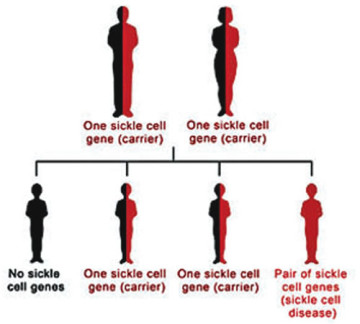When it comes to genotype, love isn’t enough
The concerned mother was frantic. Her son who has sickle cell disorder had developed priapism – an abnormal and often painful persistent erection of the penis – which happens to be one of the many complications sickle cell patients encounter as they battle the disorder.
Being a medical emergency, the worried mother was advised to take her son to the hospital without further delay; else, the engorged tissues might die and this might affect her son’s virility if he survives the ordeal.
If this unnamed mother is lucky to still have her child alive, the Dickson-Ibekwes are not; they lost their daughter, Angela, an undergraduate student of Economics at Bells University of Technology, Sango Ota, Ogun State, to the complications of sickle-cell disease about five years ago.
This is a small glimpse into the world of SCD, where affected families virtually engage in daily battles to keep their affected children alive.
Dr. Kunle Adedayo explains that SCD is a genetic disease. Those who have it inherit two genes for sickle haemoglobin – one from each parent.
He says, “Sickle haemoglobin causes red blood cells to develop a sickle, or crescent, shape. Sickle cells are stiff and sticky. They tend to block blood flow in the blood vessels of the limbs and organs. Blocked blood flow can cause pain and organ damage. It can also raise the risk for infection.”
Experts say in sickle cell patients, crises are a given, as the abnormal red blood cells can sometimes clog sections of blood vessels, leading to episodes of pain, which can be severe. “These episodes, a.k.a vaso-occlusive crisis, are generally known as sickle cell crisis,” they say.
Adedayo says while normal cells are regularly replaced in healthy people, among sickle cell patients, abnormal blood cells have a shorter life-span and are not replaced as quickly as normal cells.
“This leads to a shortage of red blood cells (anaemia), with the attendant tiredness and breathlessness, especially after any physical exertion. Worse, patients may sometimes need blood transfusion to curtail the anaemia,” the physician explains.
Adedayo points out that normal red blood cells move easily through the blood vessels, taking oxygen to every part of the body. “But sickled cells can get stuck and block blood vessels, which stops the oxygen from getting through. This can cause a lot of pain in the hands, feet, belly, back and chest, which may last for hours or days. The crisis can also harm organs, muscles, and bones,” he notes.
Physicians warn that the potential complications of sickle cell anaemia include stroke, acute chest syndrome – where the lungs suddenly lose their ability to take in oxygen, often as a result of infection; increased vulnerability to infection; and pulmonary hypertension – where the blood pressure inside the blood vessels that run from the heart to the lungs becomes dangerously high.
Physicians warn that anything could trigger crisis in a sickle cell patient, and these include cold temperatures, wind, dehydration, and too much exercise. “Again, when sickle cell patients are exposed to low oxygen as a result of cigarette smoke, or if they are exposed to high altitude like mountain climbing or air travels, they can develop vaso-occlusive crisis,” Adedayo warns.
He also discloses that though doctors are not able to predict which symptoms a child born with sickle cell disease will have, when they will start, or how serious they will be, once diagnosed via a simple blood test, the patient must be placed on antibiotics from two months of age till age five in order to prevent infection. “This is in addition to taking the routine childhood immunisations,” Adedayo counsels.
Guard against having a ‘sickler’
Many Nigerians don’t know their genotype, while some confuse it with blood group; but knowing one’s genotype is very necessary if couples – especially those preparing for marriage – must save themselves and their offspring from a lifetime of pain.
Sickle cell disease is inherited, which means it is passed from parents to children as part of their genetic make-up. Parents cannot give SCD to their children unless they both have the faulty hemoglobin in their red blood cells.
“To get SCD, a child has to inherit two sickle cell genes – one from each parent. When a child inherits the (sickle cell) gene from just one parent, that child has sickle cell trait, which means he does not have the disease but he is a ‘carrier’ and could pass it on to his children,” Adedayo explains.
“Sickle cell disease is a blood disorder in which the body produces an abnormal type of the oxygen-carrying substance, hemoglobin, in the red blood cells. Normal hemoglobin is called hemoglobin A, but people with sickle cell disease have only hemoglobin S, which turns normal, round red blood cells into abnormally curved (sickle) shapes.
“Normally, a person inherits two genes (one from each parent) that produce beta-globin, a protein needed to produce normal hemoglobin (hemoglobin A). A person with sickle cell trait inherits one normal beta-globin gene (hemoglobin A) and one defective gene (hemoglobin S) – what is medically referred to as AS.”
Doctors say people with sickle cell trait rarely have health issues because they also have some normal hemoglobin; but they can pass the sickle cell gene to their children.
In other words, when two people who have sickle cell traits (AS) marry, they can produce a child with hemoglobin S – SS, a.k.a, child with sickle cell disease.
“Both parents must have either the sickle cell trait or the disease itself for a child to have sickle cell disease,” Adedayo says.
The ugly numbers
Here’s the frightening statistics: If you and your partner both have sickle cell trait (AS), your child has a 25 per cent chance of being born with sickle cell disorder (SS). If only one of you has sickle cell trait (AS), your child cannot be SS, but there is a 50 per cent chance that your child will be AS.
If one parent is SS and one parent is AS, there is a 50 per cent chance that their children will be SS.
Doctors therefore advise intending couples to know their genotypes and forgo relationships that can lead to the birth of a child with this painful disorder.
PUNCH.








